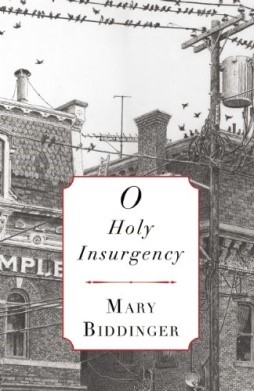91 pages, $14
Review by Sara Henning
O Holy Insurgency, Mary Biddinger’s second full-length collection of poetry, investigates the trope of love poem within an unrelenting rustbelt backdrop. This universe of desire is not just a savvy reinvention of romance, but a meditation on power in a stifling world. As I read these poems I am reminded of Helene Cixous’ apropos words from “The Scene of the unconscious to the Scene of History”: “at a certain moment for the person who has lost everything, whether that means a being or a country, language becomes the country. One enters the country of words.” Biddinger forfeits her physical tie to a world that fails her with a linguistic soiree of feminine Eros. These candid poems apply hyperbole and tender grit to form at times surreal, at times playful, explorations of lust as it exists in a woman’s body.
The first section, fittingly titled “Anno Domini,” Latin for “in the year of the Lord,” induces reverence in a beloved as one worships in a house of faith. The speaker’s bond is both sacred idol and defense against an underwhelming landscape. The section’s opening poem, “Dyes and Stitchery,” prepares the reader for a psychosocial climate where dogs are designated drivers, children buy cigarettes, and dirt roads are lined by “elbow-high corn.” Yet, here we meet the speaker’ object of affection, and read on as she ignites with him linguistic cataclysms that reverberate through the rest of the book. Continue reading
![[PANK]](https://pankmagazine.com/wp-content/themes/pank/assets/images/pank-logo-large.png)

